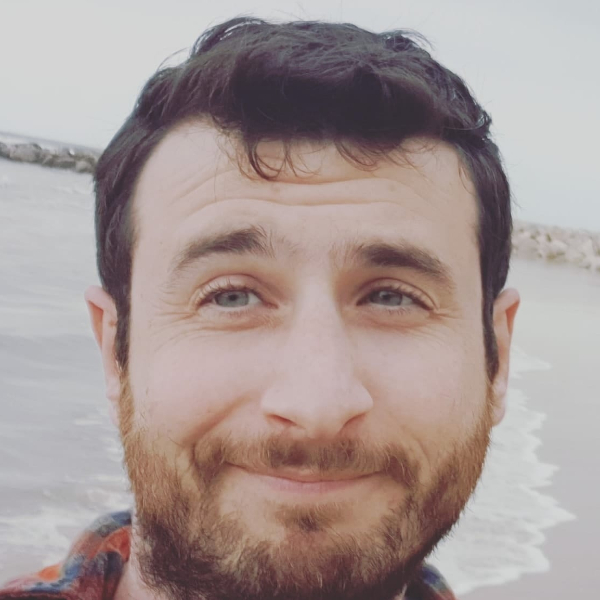Interviews with Olim
Each month, we interview an oleh or olah for our newsletter.
We invite you to read the stories of LGBTQ+ people who have made Israel their home.
"It is the only place in the world where I can feel truly safe and at home."
Interview date: May 2021
Q. Where were you born and where did you grow up?
A. I was born in east London / Essex which is also where I grew up.
Q. At what age did you come out? And how did it go?
A. I came out when I was 15. It was mainly okay. It was 1999 so things were on the up in terms of gay rights and representation compared to just a few years before. My parents on the whole were okay, although it took a couple of years for them to really get used to the idea, and friends were all okay – so overall it wasn’t too bad an experience.
Q. Were you involved at all in the LGBT community back home?
A. Not really. When I was at university I was more involved, and I was involved in the theatre scene, making and supporting plays for the LGBTQI+ community – but not directly with the community as a whole. I also used to write theatre reviews for Attitude magazine.
Q. What is your involvement (if any) in the LGBT community in Israel?
A. I’ve kind of become a part of the Bear community in Israel. I don’t help organising or anything, but I feel part of the community and attend events when I can.
Q. How long since you made Aliyah?
A. Over a year – I made Aliyah in January 2020
Q. Did you move here on your own or with family/friends/significant other?
A. I moved alone. I don’t have family here and I didn’t really know anyone. Since I’ve been able to reconnect with old friends I hadn’t spoken to for years – sometimes decades – and make an amazing group of friends. Better friends than I made at home in 36 years.
Q. Why did you make Aliyah?
A. Lots of reason. Mainly because I felt like I needed something different, a change. I love Tel Aviv and I’ve always felt very comfortable in Israel. Also, though, if I’m honest, the rise in antisemitism in the UK was reaching an uncomfortable level and it was exhausting having to almost constantly justify my existence as a Jew. It got to a point where I felt more uncomfortable ‘coming out’ as Jewish than as gay. I personally had people experiencing something antisemitic to me every month on average over about 4 years – from play posters with swastikas drawn over them because they contained the word Jewish, to being called an antisemitic slur in the street, to being asked about conspiracy theories.
Q. How is it going so far?
A. I love it here. It’s the best decision I ever made. I feel more at home here than I’ve felt anywhere else. I travelled around a lot and lived here and there, but this is where I can see myself settling.
Q. What do you do in terms of work?
A. I’m the content department manager of a digital communications agency
Q. How is your Ivrit?
A. It’s not too bad. I still find it difficult to get the confidence to speak, but I understand most of what I hear. So I have a lot of conversation with groups where everyone else is speaking in Hebrew and I’m responding in English. When put into a situation where somebody doesn’t speak English, I can totally hold a conversation – slow and not with the best vocab, but I can do it.
Q. What has been your biggest challenge so far?
A. Probably learning Hebrew. I didn’t manage to do Ulpan the way I wanted to because of Corona issues – so I still have to do that. I try to speak but get responded to in English all the time, which makes it difficult to improve. Also, getting my driving license. I’ve been trying to get it switched over since December and I still haven’t got it – I think this is also because of Corona. If it weren’t for lockdowns, I could have just gone into the Misrad Ha’Rishui.
Q. How do you perceive the Israeli LGBT community?
A. I think as a gay, Jewish man, it is the only place in the world where I can feel truly safe and at home – I’m talking about Tel Aviv specifically, of course. Every building and door has a mezuzah and every street has a rainbow flag. Everyone LGBT person I’ve met has been really supportive – as have most Israelis (both Sabra and Oleh/Olah alike).
Q. If you were making aliyah now, would you do anything differently?
A. I wanted to complete the process within a year, which I’m glad I did, but I wish I had saved a bit more money. Tel Aviv is an expensive city and I wanted to live in a nice area on my own. Also I didn’t want to have to work immediately, so I could concentrate on Ulpan. As I mentioned, I also wish I’d started trying to get my driving license sooner. Aside from that, no. I’ve been really lucky but also tenacious in making sure this is a really good experience and – Corona aside – I couldn’t have asked for anything more.
Paul

Our Newsletter
Sign up if you would like to receive a monthly email listing events of interest to LGBT English-speakers in Israel, an interview with an oleh/olah and other useful information.
Want to be interviewed?
Complete the form below and we will get back to you.
Our Newsletter
Sign up if you would like to receive a monthly email listing events of interest to LGBT English-speakers in Israel, an interview with an oleh/olah and other useful information.
Want to be interviewed?
Complete the form below and we will get back to you.


